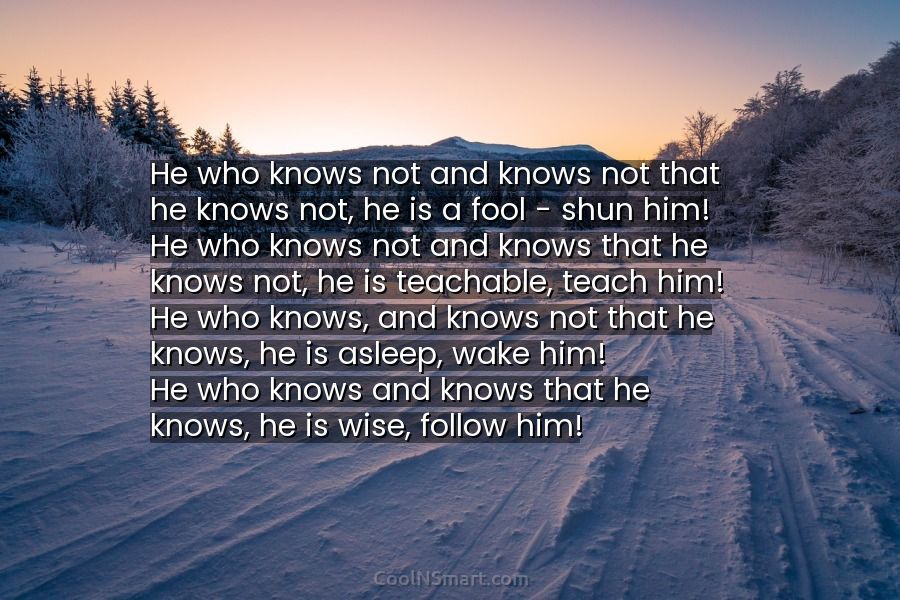
He Who Knows Not and Knows That He Knows Not
Life is a perpetual quest for knowledge and growth. Along this journey, we often encounter crossroads where we must grapple with the limits of our understanding and embark on a humble path of self-discovery. The renowned philosopher Socrates famously proclaimed, “I know that I am intelligent because I know that I know nothing.” This enigmatic statement encapsulates the profound wisdom that true knowledge begins with the recognition of one’s ignorance.
The Parable of the Blind Men and the Elephant
An ancient parable aptly illustrates the pitfalls of assuming knowledge without genuine understanding. A group of blind men, each touching a different part of an elephant, form vastly different perceptions of the animal. One concludes it to be like a wall, another like a spear, and another like a rope. Their limited perspectives lead them to contradictory and incomplete conclusions. Similarly, our fragmented understanding of the world can lead us to erroneous assumptions and impede our path to true enlightenment.
Definition and Historical Roots
The concept of “knowing that one does not know” is rooted in ancient Greek philosophy. Socrates believed that genuine wisdom lies not in accumulating vast knowledge but in recognizing the boundaries of one’s understanding. He famously said, “The unexamined life is not worth living,” emphasizing the importance of questioning our assumptions and seeking deeper insights.
Meaning and Implications
The recognition of one’s ignorance is a fundamental step towards wisdom. It allows us to embrace the vastness of what is unknown and approach learning with humility and curiosity. While acknowledging our limitations may seem daunting, it empowers us to transcend them by relentlessly pursuing knowledge and questioning established beliefs.
Stages of Self-Awareness
- Unconscious Incompetence: Unaware of one’s ignorance, lacking skills and knowledge.
- Conscious Incompetence: Recognizing one’s lack of knowledge or skills, taking steps to improve.
- Conscious Competence: Acquiring knowledge and skills, but still requiring conscious effort to execute.
- Unconscious Competence: Mastery of knowledge and skills, performing actions without conscious thought.
The path to wisdom lies in transitioning from unconscious incompetence to unconscious competence, constantly expanding our knowledge and refining our understanding.
Benefits of Embracing Ignorance
- Intellectual Humility: Acknowledging one’s ignorance fosters a receptive and open mindset, conducive to learning and growth.
- Improved Learning: Recognizing what one does not know motivates the pursuit of knowledge and skills.
- Enhanced Curiosity: Curiosity is sparked by the realization of one’s ignorance, igniting a desire to explore the unknown.
- Avoidance of Dogmatism: The recognition of ignorance prevents the formation of rigid beliefs, promoting critical thinking and open-mindedness.
Tips and Expert Advice
- Cultivate a Humble Attitude: Embrace the fact that you do not know everything and be open to learning from diverse perspectives.
- Practice Active Listening: Engage in attentive listening, seeking to understand others’ insights without interrupting or imposing your own views.
- Seek Constructive Feedback: Actively seek feedback from others to identify areas for growth and improvement.
- Question Assumptions: Challenge your preconceptions and assumptions, engaging in critical thinking and seeking alternative viewpoints.
- Read Widely and Diversely: Expand your knowledge and broaden your perspectives by exploring various sources of information, including books, articles, and online resources.
Explanation of Tips and Expert Advice
Cultivating humility, actively listening, and seeking constructive feedback promote a receptive mindset, essential for learning and growth. Questioning assumptions and reading widely enhances critical thinking and expands understanding. These practices empower individuals to overcome the limitations of their current knowledge and embark on a continuous journey of self-discovery.
FAQ on “He Who Knows Not and Knows That He Knows Not”
Q: What is the significance of “knowing that one does not know”?
A: Recognizing one’s ignorance allows for intellectual humility, improved learning, enhanced curiosity, and avoidance of dogmatism.
Q: How can I embrace my ignorance effectively?
A: Cultivate a humble attitude, actively listen, seek constructive feedback, question assumptions, and read widely and diversely.
Q: Does acknowledging one’s ignorance imply a lack of intelligence?
A: On the contrary, it indicates intellectual maturity and a willingness to learn and grow.
Conclusion
Embracing the wisdom of “knowing that one does not know” is a lifelong pursuit that empowers us to transcend the limits of our current understanding. By recognizing our ignorance, we open ourselves to the boundless possibilities of learning and personal growth. As the great philosopher Plato said, “The beginning of wisdom is the realization of one’s own ignorance.” Let us all strive to embrace this profound truth and embark on a continuous journey of self-discovery.
Are you intrigued by the concept of knowing that one does not know? Share your thoughts and experiences in the comments section below!

Source Image: www.pinterest.com

Source Image: www.pinterest.com

Source Image: www.pinterest.com
Thanks for your careful examination of this topic. He Who Knows Not And Knows That He Knows Not, provides valuable insights to enhance your learning.